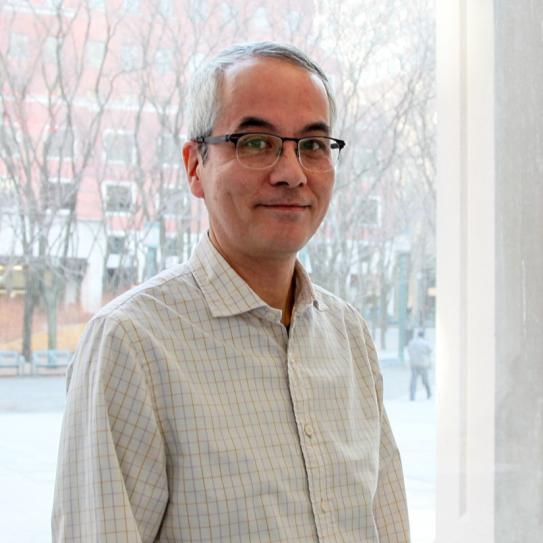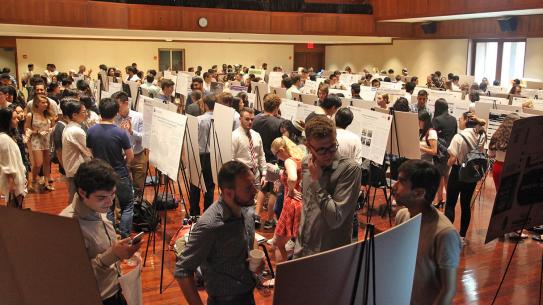
Jon Bain was born in New York City and grew up in Hawaii. He is currently a professor of philosophy of science at the Tandon School of Engineering of New York University (NYU-Tandon), with affiliations in NYU-FAS's Department of Philosophy, and NYU-Gallatin's Program in History of Science and Science Studies. He received a PhD in history and philosophy of science from the University of Pittsburgh in 1998, and an MS in physics from Pitt in 1996. Prior to NYU-Tandon, he taught in the Philosophy Department at the University of California-Riverside. His research interests include philosophy of spacetime, scientific realism, and philosophy of quantum field theory.
More specifically, he's interested in the ontological and metaphysical commitments of theories in contemporary physics; in other words, in how such theories can be interpreted. His current research involves debates over the nature of particles in quantum field theories, the concept of emergence in effective field theories, and general issues concerning the notion of structure and how it might be represented in theories in physics.
Education
University of the Pacific (Stockton, CA), 1989
B.S. (cum laude), Applied Mathematics/Physics
University of Pittsburgh, 1996
M.S., Physics
University of Pittsburgh, 1996
M.A, History and Philosophy of Science
University of Pittsburgh, 1998
Ph.D., History and Philosophy of Science
Experience
NYU Tandon School of Engineering
Professor of Philosophy of Science
From: April 2017 to present
NYU Tandon School of Engineering
Associate Professor of Philosophy of Science
From: September 2005 to April 2017
Polytechnic University
Assistant Professor of Philosophy of Science
From: September 1999 to September 2005
University of California-Riverside
Visiting Assistant Professor, Philosophy Department
From: September 1998 to September 1999
Publications
Journal Articles
- 'The RT Formula and its Discontents: Spacetime and Entanglement', Synthese (2020), https:/doi.org/10.1007/s11229-020-02836-4.
- 'Spacetime as a Quantum Error-Correcting Code?', Studies in History and Philosophy of Modern Physics 71 (2020), 26-36.
- 'Why be Natural?', Foundations of Physics 49 (2019), 898-914..
- 'Non-Locality in Intrinsic Topologically Ordered Systems', Studies in History and Philosophy of Modern Physics 66 (2019), 24-33.
- 'Topological Order and Emergence', Philosophica 92, (2017), 77-112.
- 'Emergence and Mechanism in the Fractional Quantum Hall Effect', Studies in History and Philosophy of Modern Physics 56, (2016), 27-38.
- 'Pragmatists and Purists on CPT Invariance in Relativistic Quantum Field Theories', in U. Mäki, S. Ruphy, G. Schurz, I. Votsis (eds.) Recent Developments in the Philosophy of Science: EPSA13 Helsinki, Springer (2015).
- 'Three Principles of Quantum Gravity in the Condensed Matter Approach', Studies in History and Philosophy of Modern Physics 46 (2014), 154-163.
- 'Emergence in Effective Field Theories', European Journal for Philosophy of Science 3 (2013), 257-273.
- 'CPT Invariance, the Spin-Statistics Connection, and the Ontology of Relativistic Quantum Field Theories', Erkenntnis 78 (2013), 797-821.
- 'The Emergence of Spacetime in Condensed Matter Approaches to Quantum Gravity', Studies in History and Philosophy of Modern Physics 44 (2013), 338-345.
- 'Category-Theoretic Structure and Radical Ontic Structural Realism', Synthese 190 (2013), 1621-1635.
- 'Effective Field Theories', in Batterman, B. (ed.) The Oxford Handbook of Philosophy of Physics (Oxford University Press, 2013): 224-254.
- 'Quantum Field Theories in Classical Spacetimes and Particles', Studies in History and Philosophy of Modern Physics 42 (2011), 98-106.
- 'Relativity and Quantum Field Theory', in Petkov, V. (ed.) Space, Time, and Spacetime - Physical and Philosophical Implications of Minkowski's Unification of Space and Time (Springer, 2010), 129-146.
- 'Condensed Matter Physics and the Nature of Spacetime', in Dieks, D. (ed.) The Ontology of Spacetime, Vol. 2 (Elsevier Press, 2008), 301-329.
- 'Spacetime Structuralism', in Dieks, D. (ed.) The Ontology of Spacetime, Vol. 1 (Elsevier Press, 2006), 37-66.
- Essay Review: Hattich, F., Quantum Processes: A Whiteheadian Interpretation of Quantum Field Theory, in Studies in History and Philosophy of Modern Physics 36 (2005), 680-690.
- 'Theories of Newtonian Gravity and Empirical Indistinguishability', Studies in History and Philosophy of Modern Physics 35 (2004), 345-376.
- 'Einstein Algebras and the Hole Argument', Philosophy of Science 70 (2003), 1073-1085.
- 'What Should Philosophers of Science Learn from the History of the Electron?', (with J. D. Norton) in Buchwald, J. and A. Warwick (eds.), Histories of the Electron: The Birth of Microphysics, (MIT Press, 2001), 451-465.
- 'Against Particle/Field Duality: Asymptotic Particle States and Interpolating Fields in Interacting QFT (or: Who's Afraid of Haag's Theorem?)', Erkenntnis 53 (2000), 375-406.
- 'The Coordinate-Independent 2-component Spinor Formalism and the Conventionality of Simultaneity', Studies in History and Philosophy of Modern Physics 31 (2000), 201-226.
- 'Weinberg on QFT: Demonstrative Induction and Underde-termination', Synthese 117 (1999), 1-30.
- 'Whitehead's Theory of Gravity', Studies in History and Philosophy of Modern Physics 29 (1998), 547-574.
Authored/Edited Books
CPT Invariance and the Spin–Statistics Connection, Oxford University Press (2016).
Book Reviews:
- Rickles, D. (ed.) The Ashgate Companion to the Philosophy of Physics, Metascience 18 (2009): 347-357.
- Healey, R. Gauging What's Real: The Conceptual Foundations of Contemporary Gauge Theories, Philosophy of Science 75 (2008): 479-485.
- Arabatzis, T. Representing Electrons, in International Studies in Philosophy of Science 20, no. 3 (2006): 347-357.
- Pesic, P., Seeing Double: Shared Identities in Physics, Philosophy, and Literature, in ISIS 93, no. 4 (2002): 670-671.
- Jammer, M., Concepts of Mass in Contemporary Physics and Philosophy, in Physics Today 53, no. 12 (2000): 67-68.
Affiliations
Affiliated Faculty, Department of Philosophy, NYU-FAS
Affiliated Faculty, History of Science and Science Studies, NYU-Gallatin
Awards
Othmer Junior Faculty Fellowship, Othmer Institute for Interdisciplinary Studies, Polytechnic University, 2004-2006.
Research
Each summer the Tandon Undergraduate Summer Research Program supports qualified undergraduates to conduct research with Tandon faculty. Here are some projects I've led:
Summer 2022
- Project: "Black Hole Interior Reconstruction and the Information Loss Paradox"
- Researchers: Kyle Lleras (Univ. Chicago), Herbert Ortiz (NYU-Tandon)
- Poster
Summer 2021
- Project: "A Law-Centric View of Emergence"
- Researcher: Jasmine Murphy (NYU-Tandon)
- Poster
Summer 2020
- Project: "ER=EPR? Topology and Quantum Entanglement"
- Researcher: Nigel Shen (NYU-Tandon)
- Poster
Summer 2019
- Project: "Spacetime and Entanglement"
- Researchers: Gabriela Avila (NYU-Tandon), Sam Granade (NYU-Tandon)
- Poster
Summer 2018
- Project: "Holographic Spacetime and Quantum Error Correction Codes"
- Researchers: Mengmeng Li (NYU-Shanghai), Edison Murairi (NYU-Abu Dhabi)
- Poster
Summer 2017
- Project: "Non-Locality in Intrinsic Topologically Ordered Systems"
- Researcher: Avedis Baghdasarian (NYU-Tandon)
- Poster
Summer 2016
- Project: "Topological Order and Emergence"
- Researcher: Song-Chen Xia (NYU-Tandon)
- Poster
Summer 2015
- Project #1: "Emergence in the Fractional Quantum Hall Effect"
- Researchers: Luis Ramirez (NYU-Poly), Wells Santos (NYU-Poly)
- Poster
- Project #2: "What Explains the Spin-Statistics Connection?"
- Researchers: Hind Al-Tantawi (NYUAD), Shearyar Khan (NYU-Poly)
- Poster
Summer 2014
- Project: "The Explanatory Power of 19th Century Mechanical Models of the Electromagnetic Aether"
- Researchers: Yilkal Abe (NYUAD), Felipe Pereira (NYU-Poly), Wells Santos (NYU-Poly)
- Poster
Information for Mentees
I’ve been at Tandon since 1999 and have served on numerous committees at the departmental, school, and university levels. I’ve mentored many undergraduates and participated each year in the Summer Undergraduate Research Program. I tend to have a flexible schedule and am always available via email or Zoom.


